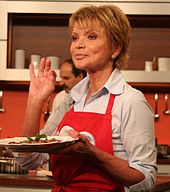The lout from the first bank
Die Lümmel von der Erste Bank is the title of a seven-part series of German comedies that were produced between 1967 and 1972. The literary model for the first part was the satirical novel Zur Hölle mit dem Ketteln by German teacher Herbert Rösler (pseudonym: Alexander Wolf) , published in 1963 . The sequels are based on motifs and characters from the same book. The main producer of the commercially extremely successful film series was Franz Seitz , who wrote the scripts for all parts under his pseudonym Georg Laforet. The second part was produced as the only one in the series of Horst Wendlandt's Rialto Film . The first three “Lümmel” films were each awarded the Golden Screen , an honor for more than three million viewers.
Novel
The satire To hell with the timpani by the teacher Herbert Rösler appeared in 1963 under his pseudonym Alexander Wolf in the Pardon library of the Bärmeier & Nikel publishing house . The book, which bears the subtitle Memoirs of a School Age, was written in the first person from the point of view of the fictional character Pepe Nietnagel and, according to the blurb, had references to reality. The success of To Hell with the Paukern led to a follow-up publication with Die Mittlere Immreife, Nietnagels collected escape attempts , in which the main character, however, focuses more on the general worries and needs of an adolescent than on school and finally to the film series Die Lümmel von der Erste Bank whose success eclipsed that of the book.
The general criticism took Wolf's satire Zur Hölle mit die Paukern in a friendly manner, calling it "realistic, as no German satirist has managed since Tucholsky " ( NDR ) or "an over-spicy cocktail" ( Welt am Sonntag ), while the Frankfurter Rundschau also criticized it on the education policy recognized. The Westdeutsche Rundschau saw in particular the figure of Nietnagel, who later also played the leading role in the scripts of all "Lümmel" films, as extremely consistent in its "sociological and personal conditions".
History of the film series
prehistory
The film producer Franz Seitz junior had made numerous entertainment , homeland and war films , including several literary adaptations , since the 1950s . Even after the cinema crisis occurred in the 1960s, the producer was able to record great successes with a number of works on the German film market, including The Black-White-Red Four-Poster Bed (1962), Moral 63 (1963) and The Young Törless (1966). In 1964 Seitz started a series of films with rascal stories based on motifs by Ludwig Thoma . Hansi Kraus made his film debut in the role of the young rascal Ludwig .
After the content of the rascal stories seemed exhausted, Franz Seitz aimed for a film series in the school environment. In April 1967 Constantin Filmverleih announced the production of the film adaptation of the satire To hell with the timpani . The main actors were Gustav Knuth , Hubert von Meyerinck , Rudolf Rhomberg and Helga Anders , but they were ultimately not used. For the role of Pepe Nietnagel , Florian Lindinger (* 1951, † 1993), the son of the actor Hugo Lindinger , was initially planned. When it turned out that the actor was not up to his task, the role was finally taken over by the tried and tested Hansi Kraus, who had already worked with director Werner Jacobs in the rascal stories . Since one expected more “Lümmel” films if they were successful, the rights to use the main characters in freely invented film material were acquired in addition to the filming rights for the book. Franz Seitz wrote all the scripts in the series under his pseudonym Georg Laforet.
The direction of the first film and three of its sequels was taken over by Werner Jacobs, who previously had three Thoma films for Seitz and the successful Peter Alexander films Der Musterknabe (1963) and ... and something like that in bed at 8 (1965). had staged, which also play in the school environment. Parts 3 and 5 of the “Lümmel” films were directed by Harald Reinl , while Franz Josef Gottlieb took on artistic responsibility for the seventh and last part .
occupation

Theo Lingen played central roles in the films as senior director of studies, Dr. Gottlieb Taft and his student opponent Hansi Kraus in the role of Pepe Nietnagel (in the second part: Pepe Notnagel). The change of the surname is due to the participation of Peter Alexander, who found the name Notnagel more appropriate. From the third part on, the name rivet nail was used exclusively again. Even Hans Terofal as goofy Schulpedell George Bloch and Rudolf Schündler as a senior teacher Dr. Arthur Knörz returned in all films.
Other roles were played by various actors. The resulting dramaturgical negligence saw the audience of the series with ironic distance. The most important, repeated characters were:
- Marion Nietnagel, Pepe's sister: Uschi Glas (parts 1, 3, 5), Hannelore Elsner (2; also as Geneviève Ponelle in parts 1 and 3)
- Kurt Nietnagel, Pepes father: Georg Thomalla (1), Willy Millowitsch (2), Gustav Knuth (3), Wolfgang Gruner (4), Fritz Tillmann (6)
- Dr. Mathilde Knörz, b. Pollhagen (wedding in part 3): Ruth Stephan (1, 3, 4, 5), Inge Wolffberg (2), Eva Maria Meineke (6)
- Senior Teacher Dr. Blue eggs: Balduin Baas (1, 2, 5, 6, 7), Harald Juhnke (3), Alexander Golling (4)
- Miss Weidt, Taft's secretary: Monika Dahlberg (1, 5, 7; also as Miss Schmitz in part 6), Johanna König (2),
- Ms. Nietnagel, Pepes mother: Ilse Petri (1), Carola Höhn (3, 4, 6)
- Helena Kersten, b. Taft, daughter of director Taft: Gila von Weitershausen (1), Evelyn Opela (7; also as Fräulein Dr. Lang in part 6)
In the role of the understanding teacher one saw Günther Schramm as Dr. Kersten (part 1), Hans Clarin as Dr. Glücklich (3), Gerlinde Locker as Julia Schumann (4) and Peter Alexander as Dr. Roland (2) and Dr. Peter Bach (4). On the side of the authoritarian teaching staff, Oliver Hassencamp as senior teacher Priehl (1), Ralf Wolter as senior teacher Geis (6), Ernst Hilbich as Dr. Heidemann (7) and Hans Korte as Professor Heinzerling (7). In addition, most of the “Lümmel” films featured prominent supporting roles in which well-known German film actors had guest appearances, including Edith Schollwer as superior of a monastery school (2), Walter Rilla as Ministerial Director Reichert (3), Werner Finck as Ministerial Director von Schnorr (4 ), Karl Schönböck as notary Munk (5) and Heinz Reincke as Mr. van Dongen (6).
Numerous young actors who were at the beginning of their careers worked as pupils, including the later pop singer Jürgen Drews (1), the then child star Heintje (2, 4, 6) and the actors Pierre Franckh (3, 4), Michaela May (3), Kristina Nel (4), Simone Brahmann (4) and Jutta Speidel (3, 4, 5, 6). The latter made her film debut in the film series. Young guest roles were also performed by Gerhart Lippert as Heinz Thomas (3), Fritz Wepper as Hubert Böhm (5), Renate Roland as Denise Moreaux (7), Ernst Stankovski as Dr. Kersten (part 7) and Ilja Richter as young Taft (7).
content



The films are about a school class on the fictional Mommsen - High School in Baden-Baden . The students, above all Pepe Nietnagel, rebel against the outdated teaching methods and authoritarian teachers through numerous pranks and intrigues . The high school students use all conceivable means to sabotage school lessons and annoy their teachers.
Against the background of the student movement of the 1960s , the films also had serious concerns. In the introduction to the audience in the first part, the pupil Pepe Nietnagel claims that “someone finally has to shine behind the scenes”, “so that mankind can find out what it really is like and what the drummers are for characters.” He reports Among other things, that the headmaster Taft's horizon “does not even extend beyond the school walls” and that senior teacher Priehl is “the typical militarist ”. In another scene, he describes his parents' generation as those who “voted for Adolf Hitler , for example ”. Nevertheless, Pepe Nietnagel is not a rebel , on the contrary: He persuades his father, a wealthy stamp dealer, to make generous donations to the Mommsen-Gymnasium in order to corrupt the principal.
The other characters are not one-dimensional either, so the teachers do not always act with bad intent. In many scenes in the series, the authoritarian characters appear rather as pitiful and involuntarily comical philistines . Several times teachers become victims of their own subordination to the authorities through orders made by the students . Headmaster Taft is old-fashioned, but occasionally gives mercy to justice and remembers in the later episodes that he himself had “a strange teacher” and that he was “quite a lout as a student”.
Most of the films also feature modern educators who are sympathetic to the students, but who do not bring about any fundamental changes. There are also numerous allusions to the sexual revolution in the series . In some student pranks, female teachers are involuntarily exposed and students don't even hesitate to reenact a mass orgy in the classroom or to undress to shock the teachers.
As a running gag , Pepe's class plays senior teacher Dr. At the beginning of every film, Knörz performed a trick that made him doubt his perception. Desperate, he always turns to his supervisor, Senior Studies Director Taft, who believes his colleague is hallucinating . In the fifth part, Taft asks Dr. Knörz, whether he smoked hashish and was " high ".
Filming
The shooting of the "Lümmel films" took place preferably during the school holidays due to the large number of young actors . However, it also happened that the main actor Hansi Kraus “came to school four weeks later or maybe had to leave four weeks earlier”. While numerous outdoor shots were taken at original locations in Baden-Baden, the Maximiliansgymnasium in Munich could be seen as the school building from the third part . In the first part, however, the Kaiser-Friedrich-Ufer high school in Hamburg served as the school backdrop. The second part shows the Askanisches Gymnasium in Berlin-Tempelhof . Other locations in the series were Nürtingen , Kirchheim unter Teck , Bad Homburg vor der Höhe , Lindau am Bodensee , Offenburg and Amsterdam . Indoor recordings were made in the film studios of Studio Hamburg in Hamburg-Tonndorf , Bavaria Film in Geiselgasteig , CCC-Film in Berlin-Haselhorst and Inning am Ammersee .
Film music
The film music for parts 1 and 3 to 7 comes from the film composer Rolf Alexander Wilhelm , who used the traditional melody of the student song Gaudeamus igitur ( ) as a recurring theme . The soundtrack for the second part comes from Peter Thomas . In addition, music titles by other composers can be heard in all films.
Reviews
The makers of the film series put a lot of emphasis on light entertainment, which is particularly noticeable in parts 2, 4 and 6, in which the audience favorites Peter Alexander and Heintje, who were popular at the time, took on important roles and appeared with a few hits . The entire "Lümmel" series was rejected by most of the film critics . Many of the reviews, some of which have been cited to this day, some of which denied the films any content or aesthetic claim, must be viewed in connection with the social and political changes of the late 1960s and early 1970s. The Protestant film observer wrote that the second part of the series contained “superfluous sex” and “silly allusions to socio-political events in the Federal Republic ”. The Catholic Film Service warned that the fourth part "affects children's imaginations".
Others
Hansi Kraus took over the role of Pepe hangnail 1991 and 1992 in three episodes of the series Ein Schloß am Wörthersee again (Rendezvous am Wörthersee, pictures hunting and return to the Wörthersee) . The aged Pepe Nietnagel was seen in it as a chaplain who was teaching students at a grammar school himself. In this respect, the "Lümmel" film series and Ein Schloß am Wörthersee are set in the same series . Kraus also appeared more often as a chaplain in the popular theater series Zum Stanglwirt . In the DVD release of the "Lümmel" film series in 2007, Kraus appeared in the menu navigation as a teacher.
cinemamovies
| part | logo | title | year |
|---|---|---|---|
| 1 |
|
To hell with the timpani | 1968 |
| 2 |

|
To hell with the penne | 1968 |
| 3 |

|
Pepe, the bully | 1969 |
| 4th |

|
Hurray, the school is on fire! | 1969 |
| 5 |

|
We beat the timpani in the pan | 1970 |
| 6th |
|
School is canceled tomorrow | 1971 |
| 7th |

|
Behave insufficiently! | 1972 |
Running gags
The film series includes various running gags :
- Pepe Nietnagel's exclamation: "You can't believe it!"
- The motto of Head of Studies Taft Fresh, pious, happy, free
- The " hallucinations " of the senior teacher Knörz, which always turn out to be jokes of the students
- The clumsiness of the school pedell Bloch
- The frequent Aber Gottlieb ... from the headmaster's wife
- The headmaster's corruption , which is why Pepe is not expelled from school
Related productions
Timely, thematically similar (“Lümmel”, “Pauker” or “Penne”) film productions.
precursor
- Our Pauker (1965, repetition 1967) 20-part television series with Georg Thomalla as "Pauker" Schulz in the lead role
- Lausbubengeschichten (from 1964) Film series by Franz Seitz Filmproduktion with "Lausbub" Hansi Kraus, Georg Thomalla and Balduin Baas
Rialto film productions
- Class Wedges (1969) (successor to The Devil with the Penne the Rialto movie)
- Die Feuerzangenbowle (1970, with Uschi Glas and Theo Lingen) (remake of the classic film of the same name from 1944 )
- The main thing is holidays (1972, with Peter Alexander and Theo Lingen)
Lisa film productions
- Always Trouble with the Timpani (1968, with Georg Thomalla)
- Our timpanists take to the air (1970, with Georg Thomalla)
- Music, music - the penne wobbles (1970, with Hansi Kraus)
- When my darling hits the drum (1971, with Theo Lingen and Uschi Glas)
- My daughter - your daughter (1972, with Hansi Kraus and Georg Thomalla, directed by Werner Jacobs)
Allianz Film productions
- Twenty girls and the timpanists: Today the penne is upside down (1971, directed by Werner Jacobs)
- I too was only a mediocre student (1974, with Georg Thomalla, directed by Werner Jacobs)
Productions by Franz Seitz Filmproduktion
- The flying classroom (1973, directed by Werner Jacobs, based on the book by Erich Kästner, was also made into a film in 1955)
literature
- Alexander Wolf : To hell with the timpani . Illustrations by Kurt Halbritter . Rowohlt, Reinbek bei Hamburg 1991, ISBN 3-499-10874-7 (121 pages).
DVDs
- The lout from the first bank. (7 films on 7 DVDs). Remastered. StudioCanal. 2014. EAN: 4006680070261
Individual evidence
- ↑ a b Interview with Hansi Kraus. In: tv-kult.com. March 27, 2005, accessed September 16, 2018 .
- ↑ Series Our Pauker
- ↑ Follower of To the Devil with the Penne , see trailer

